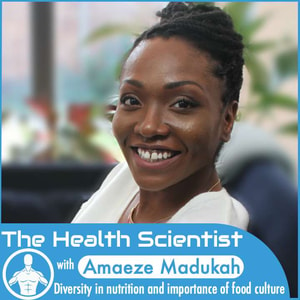Ep.41 Amaeze Madukah: Diversity in nutrition and the importance of food culture

Amaeze is a Registered Nutritionist (ANutr) with a Masters degree in Clinical Nutrition, Diploma in Counselling and is the founder of the health consultancy Life’s Recipe. With a background in product development Ameze now works in both the private and public sectors with individuals and groups to cultivate a sustainable, healthy relationship with food to improve health outcomes. Her passion for inclusive wellness and nutrition led her to start the @wellness_in_colour on Instagram – a community dedicated to supporting Black and Ethnic people.
In this episode we cover:
- An intro to the fun involved in growing your own vegetables
- Amaeze's career path in nutrition and role in promoting an understanding of diversity in health care
- How a Euro-centric model of nutrition doesn't take into account the food traditions of minority groups
- Why is one, single message or set of guidelines not sufficient for a diverse population.
- The importance of continued education and professional development in nutrition to help us understand and cater to diversity
- The palm oil example of how a culinary staple for a minority group can be incorrectly demonised by a majority group when taken out of context
- Health inequalities amongst black and ethnic minorities (BAEM) and their relation to nutrition
- How nutrition messages need to be tailored to the specific needs of minorities in order to reduce the inequalities
- Unconscious bias and the power distance index and how they affect health care amongst black and ethnic minority groups
- The many other barriers to improving health care and nutrition support to BAEM groups
- Why learning more about other diet-traditions is as important as learning to tailor a diet to individual needs
- How to navigate conversations around diversity with nutrition professionals
- The lack of diversity in the nutrition field and how it may deter some people from BAEM backgrounds from moving into the field
- Why BAEM groups may feel unrepresented and therefore discouraged when looking for nutrition help
- The importance of having these conversations about diversity
